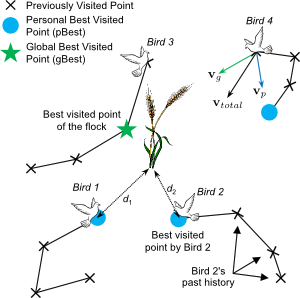
The Particle Swarm Optimization algorithm mimics the natural processes observed in bird flocks while searching for food
Global optimization techniques have a wide range of applications in engineering, science, and mathematics. They comprise a small subset of optimization techniques (or metaheuristics) which can attempt to optimize a given problem without any a priori knowledge. This is particularly important in the field of electromagnetics, where Maxwell’s equations describe the operation of devices such as antennas and microwave circuits. In general, Maxwell’s equations can be categorized as coupled vector partial differential equations, leading to very complicated function landscapes. From an optimization perspective, the resulting fitness functions describing antenna and microwave circuit performance are typically multimodal, non-differentiable, highly dimensional, non-convex, nonlinear, discontinuous, and ill-conditioned functions. Basically, optimization problems in electromagnetics fall within the hardest class of optimization problems to solve. To make matters worse, engineers usually have very little knowledge about the best place to start searching for good designs. Among the various algorithms in literature, my primary experience has been with the usage of nature-inspired optimization techniques, which attempt to mimic naturally-occurring processes observed by scientists. One such example is the Particle Swarm Optimization algorithm. This algorithm attempts to mimic a flock of birds searching for food in a given landscape, as illustrated in the figure to the right. Other techniques that I have used include Genetic Algorithms and Covariance Matrix Adaptation Evolution Strategies. My primary interest in these algorithms is their application in achieving excellent designs for a given application and also in their usage to give devices intelligence.
Related Publications
- High-Performance Circularly-Polarized Patch Subarrays for Dual-Band Direct-to-Earth Communications in Future Mars Rover Missions
J. M. Kovitz, J. Santos, Y. Rahmat-Samii, N. Chamberlain, and R. Hodges, “Enhancing Communications for Future Mars Rovers: Using high-performance circularly polarized patch subarrays for a dual-band direct-to-Earth link,” IEEE Antennas and Propagation Magazine, vol. 59, no. 4, pp. 50-61, June 2017.
- Feed Horn Optimization using Feed+Reflector Co-Simulation for Advanced Reflector Antennas
J. M. Kovitz, V. Manohar, and Y. Rahmat-Samii, “Feed Horn Optimization using Feed+Reflector Co-Simulation for Advanced Reflector Antennas,” 2017 International Applied Computational Electromagnetics Society (ACES) Symposium, March 2017.
- Design and Implementation of Broadband MEMS RHCP/LHCP Reconfigurable Arrays Using Rotated E-Shaped Patch Elements
J.M. Kovitz, H. Rajagopalan and Y. Rahmat-Samii, “Design and Implementation of Broadband MEMS RHCP/LHCP Reconfigurable Arrays Using Rotated E-Shaped Patch Elements,” IEEE Transactions on Antennas and Propagation, vol. 63, no. 6, pp. 2497 – 2507, June 2015.
- Enhancing the Power Capabilities of the Stepped Septum Using an Optimized Smooth Sigmoid Profile
I. Kim, J. M. Kovitz, and Y. Rahmat-Samii, “Enhancing the Power Capabilities of the Stepped Septum Using an Optimized Smooth Sigmoid Profile,” IEEE Antennas and Propagation Magazine, vol. 56, no. 5, pp. 16-42, October 2014.
- MEMS Reconfigurable Optimized E-Shaped Patch Antenna Design for Cognitive Radio
H. Rajagopalan, and J. M. Kovitz, and Y. Rahmat-Samii, “MEMS Reconfigurable Optimized E-Shaped Patch Antenna Design for Cognitive Radio,” IEEE Transactions on Antennas and Propagation, vol. 62, no. 3, pp. 1056-1064, March 2014.
- Sigmoid profiled septum: Evaluation of the parabolic reflector with the septum feed horn
I. Kim, J. M. Kovitz, and Y. Rahmat-Samii, “Sigmoid profiled septum: Evaluation of the parabolic reflector with the septum feed horn,” in Proceedings of the IEEE Antenna and Propagation Society International Symposium, pp. 236-237, July 2013.
- Ensuring robust antenna designs using multiple diverse optimization techniques
J. M. Kovitz and Y. Rahmat-Samii, “Ensuring robust antenna designs using multiple diverse optimization techniques,” in Proceedings of the IEEE Antenna and Propagation Society International Symposium, pp. 408-409, July 2013.
- Recent advances in evolutionary optimization techniques in applied electromagnetics
Y. Rahmat-Samii and J. M. Kovitz, “Recent advances in evolutionary optimization techniques in applied electromagnetics,” in Proceedings of the URSI International Symposium on Electromagnetic Theory, May 2013.
- Frequency Reconfigurable E-shape Patch Antenna using Nature Inspired Optimization
H. Rajagopalan, J. M. Kovitz, and Y. Rahmat-Samii. “Frequency Reconfigurable E-shape Patch Antenna using Nature Inspired Optimization,” in Proceedings of the IEEE Antennas and Propagation International Symposium, Chicago, IL, United States, July 2012.
- Nature-Inspired Optimization Techniques in Communication Antenna Designs
Y. Rahmat-Samii, J. M. Kovitz, and H. Rajagopalan, “Nature-Inspired Optimization Techniques in Communication Antenna Designs,” Proceedings of the IEEE, vol. 100, no. 7, pp. 2132-2144, July 2012.
